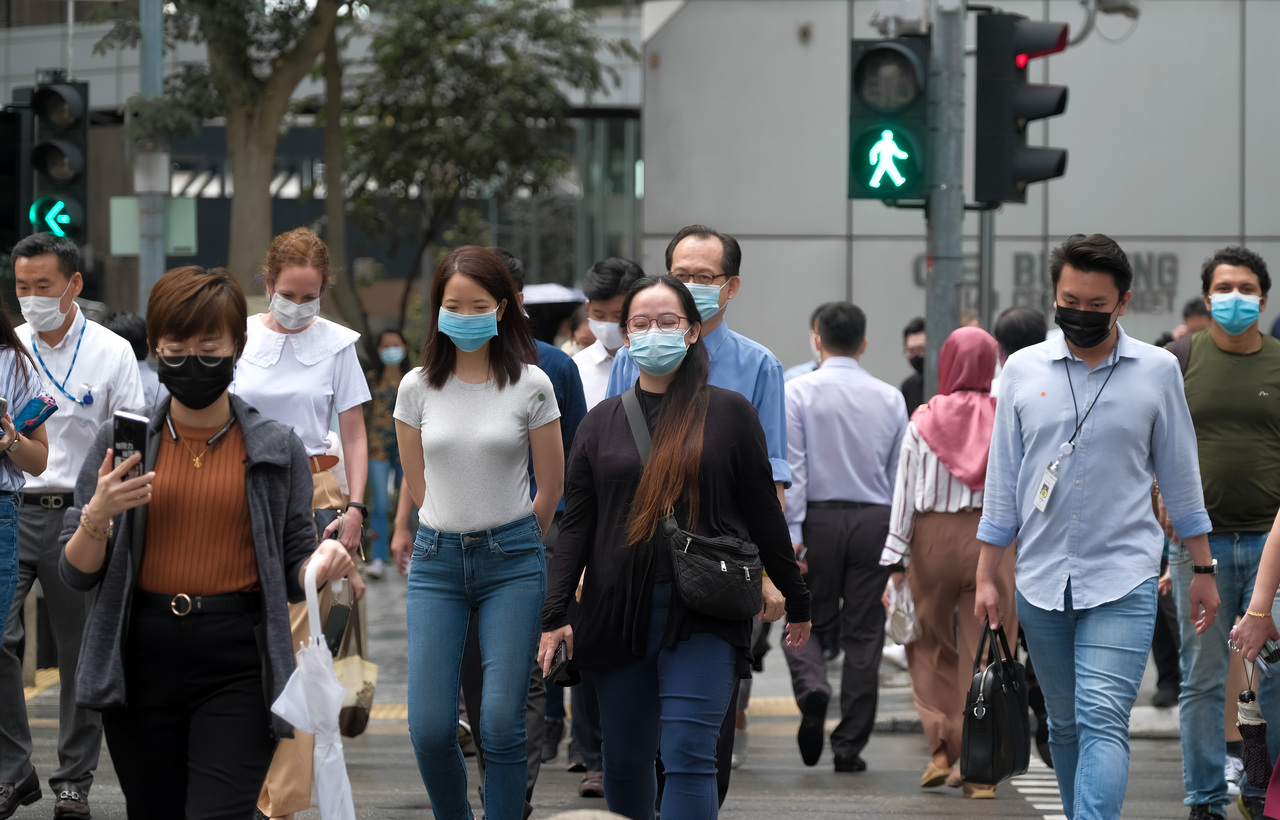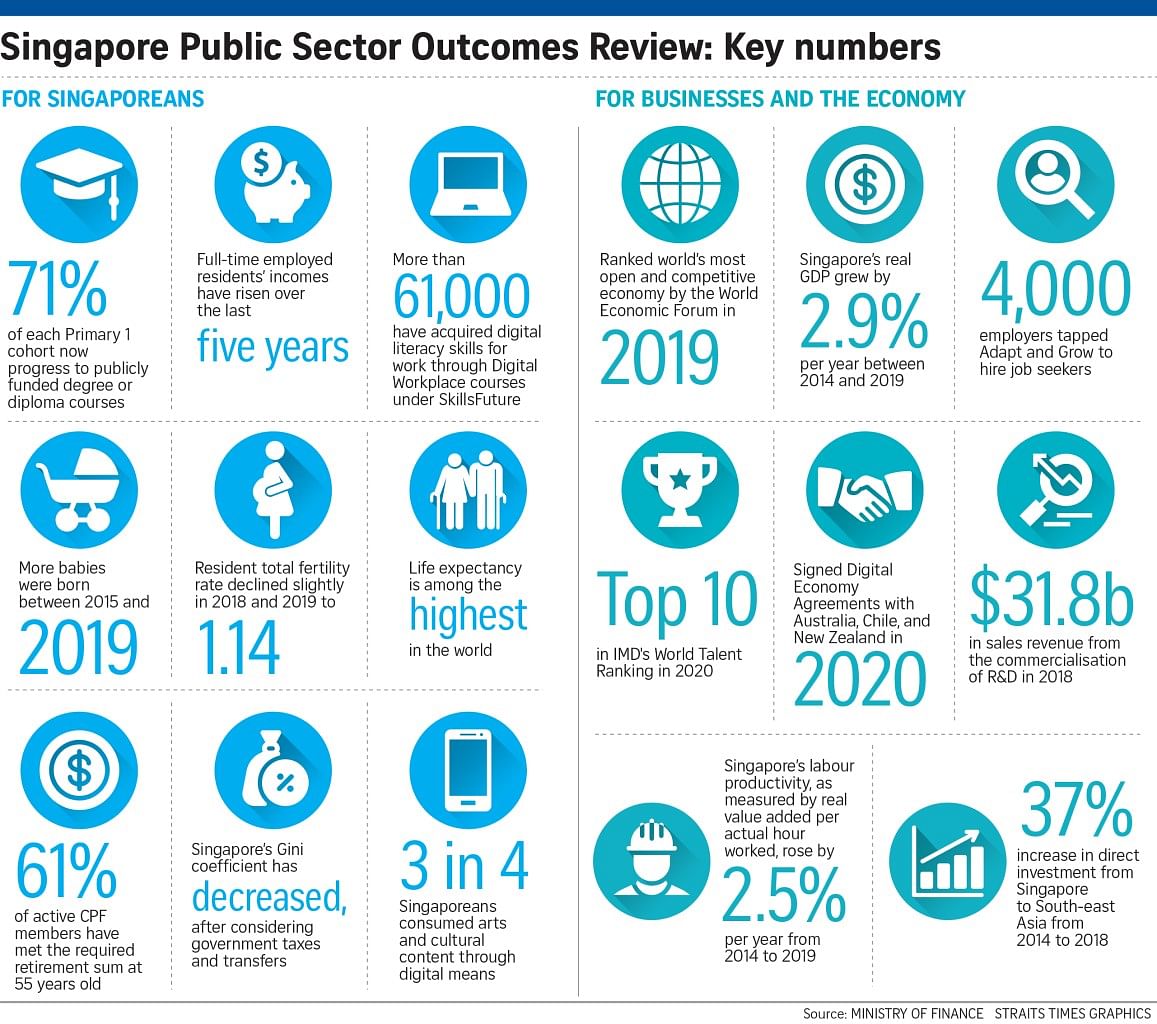Singapore sees rising incomes, falling inequality
Sign up now: Get ST's newsletters delivered to your inbox

For the first time in five years, 2019 shows Singapore's Gini coefficient dipping below 0.4.
ST PHOTO: GAVIN FOO
Incomes in Singapore have continued to rise in the past five years, while necessities such as education remain affordable.
The country also continues to be business-friendly and internationally competitive.
These are among the key achievements of the public service up until last year in most cases, according to a new report released by the Ministry of Finance (MOF) yesterday.
The Singapore Public Sector Outcomes Review, a stocktaking of the sector's work that is unveiled every two years, rounds up key figures in such areas as the economy and social support. Here are four key takeaways from the report:
Lower income inequality, more work opportunities
For the first time in five years, last year shows Singapore's Gini coefficient - a measure of income inequality - dipping below 0.4. A Gini coefficient above 0.4 usually signals a large income gap.
After taking into account taxes and transfers, it fell from 0.452 to 0.398 last year.
Similarly positive is the rise in employment incomes across the board, with those in the bottom 20th percentile rising faster than at the median, which is the mid-point in a range.
Deputy Prime Minister Heng Swee Keat, referencing the report, noted in a Facebook post that "Singapore residents who are employed full time have seen incomes rise 3.8 per cent per year over the past five years".
Another indicator of progress is the increased number of residents employed, including women and seniors, in the last five years.
More than half of them are professionals, managers, executives and technicians (PMETs), with the PMET share among employed residents growing from 54.3 per cent in 2015 to 58.3 per cent last year.

Singaporeans also have more opportunities to pick up new skills.
By the end of last year, 500,000 individuals and 14,000 enterprises had benefited from SkillsFuture initiatives.
The stork, however, continues to elude even more Singaporeans, causing the country's resident total fertility rate to decline from 1.24 in 2015 to 1.14 last year.
But efforts have been made to encourage families to have children. For example, the number of pre-school places has swelled by more than 30 per cent since 2016. They have become more affordable as well, with higher subsidies.
Competitive economy and workforce
Singapore took the top spot among the world's most competitive economies, according to the World Economic Forum last year and the International Institute for Management Development this year.
Even amid the pandemic, the Economic Development Board secured $13 billion of fixed asset investment commitments in the first four months of this year.
Businesses in Singapore also geared up for longer-term opportunities by venturing into the region and going digital.
For example, direct investment by Singapore-based companies in South-east Asia increased by 37 per cent in the last five years.
More are also going digital: 216,000 businesses have registered for PayNow Corporate, enabling them to send and receive e-payments instantly.
Shoring up Singapore's competitive edge is the country's highly regarded workforce - the only one in Asia to enter a list of the top 10 most competitive places for talent in the world.
Pro-business environment and access to digital services
This year, Singapore ranked second in the World Bank's Ease of Doing Business Index, and did well in two other indicators - fourth in the world for starting a business and first in the world for enforcing contracts.
It takes just 11/2 days to start a business in Singapore.
Businesses have also been able to innovate using faster approvals from the authorities.
Last year, 77 per cent of businesses were "very or extremely satisfied" with the quality of government e-services - a jump of 8 percentage points from 2018.
Singaporeans' access to digital government services has also improved, with the LifeSG app allowing them to access more than 40 services.
Slowing growth and employment due to Covid-19
Covid-19 has put a dent in the economy. The real gross domestic product growth rate is expected to contract by between 6.5 per cent and 6 per cent this year.
But there remain pockets of resilience such as biomedical manufacturing, and information and communications, said the report.
The labour market continues to face downward pressure, with the resident unemployment rate reaching 4.7 per cent in September.
The SGUnited Jobs and Skills Package was introduced this year to expand job, traineeship and skills training opportunities. More than 117,500 were available as at August.
The full report can be found at go.gov.sg/SPOR


